Veranstaltungen und Aktivitäten
DIJ co-sponsors hybrid book talk on Japan’s Nuclear Disaster
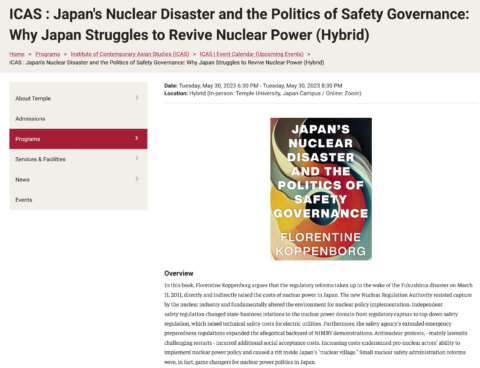
In this book talk, Florentine Koppenborg (Technical University of Munich) argues that the regulatory reforms after the Fukushima disaster on March 11, 2011, directly and indirectly raised the costs of nuclear power in Japan. The new Nuclear Regulation Authority resisted capture by the nuclear industry and fundamentally altered the environment for nuclear policy implementation. Independent safety regulation changed state-business relations in the nuclear power domain from regulatory capture to top-down safety regulation, which raised technical safety costs for electric utilities. Antinuclear protests, – mainly lawsuits challenging restarts – incurred additional social acceptance costs. Increasing costs undermined pro-nuclear actors‘ ability to implement nuclear power policy and caused a rift inside Japan’s „nuclear village.“ Small nuclear safety administration reforms were, in fact, game changers for nuclear power politics in Japan. The book talk takes place on May 30, 6.30 pm at Temple University’s Japan Campus and online. Details and registration here
Joint DIJ and JDZB conference ‚Countryside Democracy in Japan and Germany‘
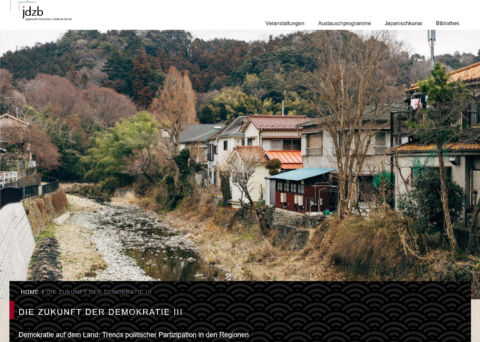
On the occasion of the nationwide local elections in prefectures and municipalities in Japan in April 2023, experts and political activists from Japan and Germany will discuss opportunities, trends, and challenges as well as similarities and differences between the two countries. Specifically, the conference Countryside Democracy in Japan and Germany: Trends in Political Participation will address the following questions: How does a vital democracy manifest itself in rural regions? What opportunities for co-determination and political participation exist in contrast to urban centers, especially for younger people? How is political and social participation evolving, for example through digital forms of involvement? Or do we observe an increasing „disenchantment with politics“? Participants include DIJ political scientist Sebastian Polak-Rottmann as panelist, DIJ alumnus Yosuke Buchmeier as moderator, alumna Gabriele Vogt as commentator, and deputy director Barbara Holthus. The conference is jointly organized by the DIJ and the Japanese-German Center Berlin (JDZB). It takes place online on May 11, 17-19h JST. Conference languages are German and Japanese with simultaneous interpretation. Details here
Unser Forschungsteam sucht Verstärkung
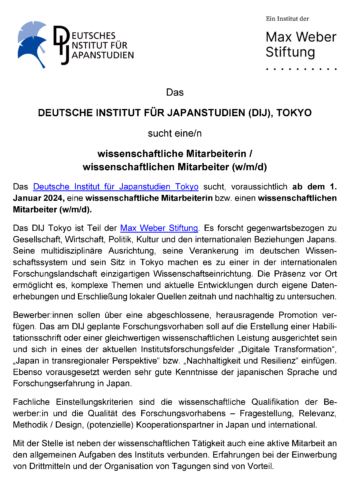 Das DIJ sucht eine wissenschaftliche Mitarbeiterin / einen wissenschaftlichen Mitarbeiter (w/m/d) mit einer abgeschlossenen, herausragenden Promotion, sehr guten Kenntnissen der japanischen Sprache und Forschungserfahrung in Japan. Das am DIJ geplante Forschungsvorhaben soll auf die Erstellung einer Habilitationsschrift oder einer gleichwertigen wissenschaftlichen Leistung ausgerichtet sein und sich in eines der aktuellen Institutsforschungsfelder „Digitale Transformation“, „Japan in transregionaler Perspektive“ bzw. „Nachhaltigkeit und Resilienz“ einfügen. Die Stelle ist auf drei Jahre befristet, mit einer Verlängerungsmöglichkeit um weitere zwei Jahre. Sie ist voraussichtlich ab Januar 2024 zu besetzen. Bewerbungsfrist ist der 31. August 2023. Die Ausschreibung und Details finden Sie hier.
Das DIJ sucht eine wissenschaftliche Mitarbeiterin / einen wissenschaftlichen Mitarbeiter (w/m/d) mit einer abgeschlossenen, herausragenden Promotion, sehr guten Kenntnissen der japanischen Sprache und Forschungserfahrung in Japan. Das am DIJ geplante Forschungsvorhaben soll auf die Erstellung einer Habilitationsschrift oder einer gleichwertigen wissenschaftlichen Leistung ausgerichtet sein und sich in eines der aktuellen Institutsforschungsfelder „Digitale Transformation“, „Japan in transregionaler Perspektive“ bzw. „Nachhaltigkeit und Resilienz“ einfügen. Die Stelle ist auf drei Jahre befristet, mit einer Verlängerungsmöglichkeit um weitere zwei Jahre. Sie ist voraussichtlich ab Januar 2024 zu besetzen. Bewerbungsfrist ist der 31. August 2023. Die Ausschreibung und Details finden Sie hier.
Wir trauern um Professor Hans-Joachim Kornadt
Das DIJ trauert um Professor Dr. Dr. h.c. Hans-Joachim Kornadt, der am 24. April 2023 im Alter von 95 Jahren verstorben ist. Professor Kornadt war von 1968 bis zu seiner Emeritierung im Jahr 1995 Professor für Pädagogische Psychologie und Erziehungswissenschaft an der Universität des Saarlandes. Er hat die Arbeit unseres Instituts als Mitglied und später als Vorsitzender des wissenschaftlichen Beirats in den ersten sieben Jahren (1988 – 1995) mit seiner Expertise wesentlich unterstützt. Über diese Zeit hinaus begleitete er unsere Arbeit mit wohlwollendem Interesse. Für seine Verdienste, unter anderem um die deutsch-japanischen Wissenschaftsbeziehungen, wurden Professor Kornadt im Jahr 1988 der Deutsch-Japanische Forschungspreis und 2006 das Bundesverdienstkreuz Erster Klasse verliehen.
DIJ hosts ‚Transnational Research in a Multipolar World‘ conference
 Transnational research plays an essential role in global knowledge production. It also fosters mutual understanding and trust among the countries involved. This is especially true for transnational research in the social sciences and humanities, which explicitly aims at bridging and combining different national perspectives on issues of shared interest. On May 8-9, together with Sophia University Graduate School of Global Studies the DIJ will host the Max Weber Foundation conference ‚Transnational Research in a Multipolar World‘ to discuss the impact of the growing geopolitical tensions on transnational research. Particular foci will be on the limitations to scientific research in autocratic regimes; the response of national research organizations and universities to these challenges; and, taking the example of gerontology and gender studies, the response of humanities and social science research to societal challenges. The second day will focus on Eastern Europe, the Middle East, and the Indo-Pacific to explore common topics as well as new formats of transnational research against the background of ongoing geopolitical shifts. The conference will end with a keynote speech on world history made in Japan by Iokibe Kaoru (University of Tokyo). Details and registration here
Transnational research plays an essential role in global knowledge production. It also fosters mutual understanding and trust among the countries involved. This is especially true for transnational research in the social sciences and humanities, which explicitly aims at bridging and combining different national perspectives on issues of shared interest. On May 8-9, together with Sophia University Graduate School of Global Studies the DIJ will host the Max Weber Foundation conference ‚Transnational Research in a Multipolar World‘ to discuss the impact of the growing geopolitical tensions on transnational research. Particular foci will be on the limitations to scientific research in autocratic regimes; the response of national research organizations and universities to these challenges; and, taking the example of gerontology and gender studies, the response of humanities and social science research to societal challenges. The second day will focus on Eastern Europe, the Middle East, and the Indo-Pacific to explore common topics as well as new formats of transnational research against the background of ongoing geopolitical shifts. The conference will end with a keynote speech on world history made in Japan by Iokibe Kaoru (University of Tokyo). Details and registration here
DIJ deputy director meets Federal Minister Cem Özdemir
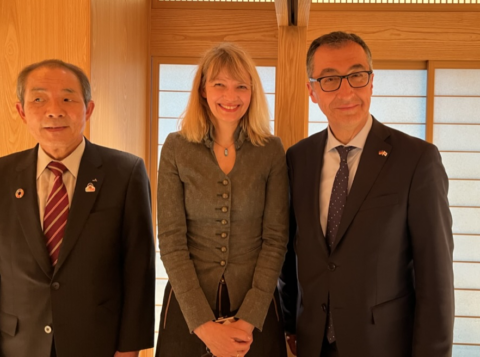
On April 25, DIJ deputy director Barbara Holthus participated in an exchange between Cem Özdemir, Federal Minister of Food and Agriculture, and Toru Nakaya, president of the Japanese Central Union of Agricultural Co-operatives. Özdemir had made a brief stop in Tokyo on his way back to Germany after participating in the G7 Agriculture Ministers‘ Meeting in Miyazaki. On April 20, Barbara Holthus and DIJ administrative director Elisabeth Köller had met Christa Nickels, former Federal Minister of Health, for a discussion about women in Japanese politics. Nickels came to Japan for the opening of the German film festival Horizonte 2023 which featured the film „Die Unbeugsamen“ (The Unbending). The film portrays several female politicians during the so-called Bonn Republic, including Nickels.
DIJ-Ökonom Markus Heckel kommentiert Wechsel an Notenbankspitze
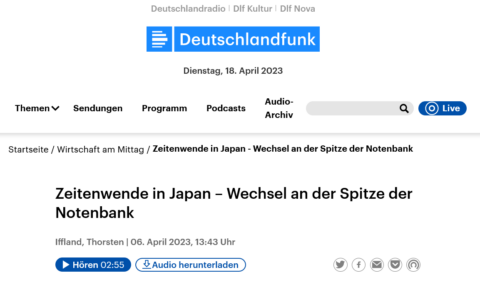
Was ist die Bilanz von über zehn Jahren, die Kuroda Haruhiko Chef der japanischen Notenbank war und was ist von seinem Nachfolger Ueda Kazuo zu erwarten? DIJ-Ökonom Markus Heckel hat den Wechsel an der Spitze der Bank of Japan im Interview mit dem Deutschlandfunk kommentiert. „Die ersten Jahre unter Kuroda sehen wir sehr positiv“, erklärt er, „aber mit dem Wechsel zu einer Kontrolle der langfristigen Zinsen sind diese positiven Effekte nicht mehr zu sehen.“ Die Stärke der zukünftigen Bank of Japan wird es sein, so Heckel, dass sie unter Ueda unabhängiger agieren kann, weniger auf Beeinflussung reagieren und ihre Politik anhand von Daten ausrichten wird. Den gesamten Beitrag können Sie hier nachhören.
DIJ Newsletter Spring 2023
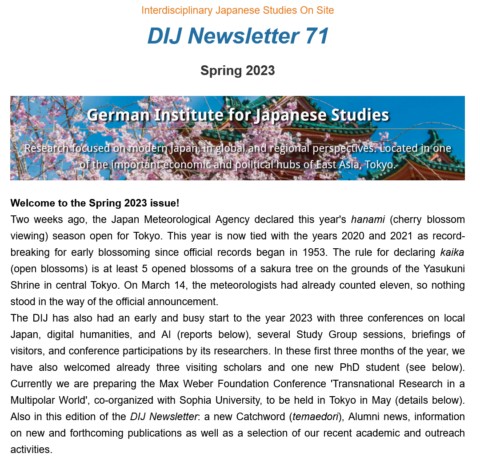
The spring issue of our DIJ Newsletter provides up-to-date insights into our research and publication activities, looks back to recent DIJ events, introduces new researchers, and gives updates on our outreach as well as on DIJ alumni activities. We hope you will enjoy exploring this new edition of the DIJ Newsletter. If you haven’t done so yet, you can subscribe to receive our Newsletters directly to your inbox. The full issues and subscription form are available here.

















 Open Access
Open Access 
